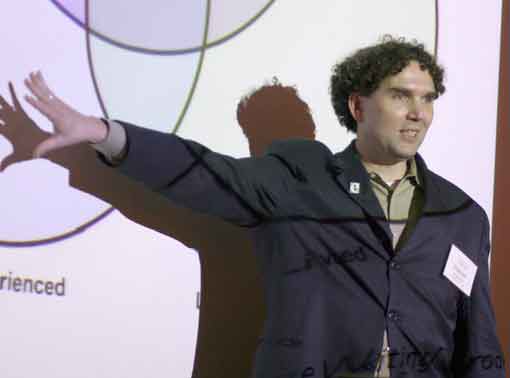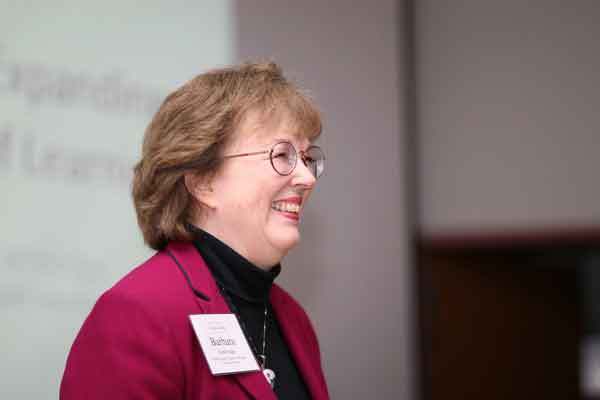 Do colleges have a responsibility for cultivating learning outside their own walls—in the towns, cities, and neighborhoods in which they live?
Do colleges have a responsibility for cultivating learning outside their own walls—in the towns, cities, and neighborhoods in which they live?
With studies finding that as much or more of the most significant learning in college happens outside of the classroom, how can faculty engage staff members and students as collaborators in studying, developing, and practicing the best practices of teaching and learning on campus?
With millions of people writing and reading blogs and with more than 94 percent of teens writing on Facebook, how can we best understand and harness the power of Internet writing and social networking for teaching and learning?
Those were just a few of the questions raised Friday at Wabash by National Council of Teachers of English (NCTE) Director Dr. Barbara Cambridge and New Century College Professor Darren Cambridge during their keynote address of the National Conference on Innovations in the Scholarship of Teaching and Learning at Liberal Arts College. (See a photo album here.)
"From anxiety about good teaching, you have moved us to great thinking about learning," Dr. Cambridge told the 70-plus liberal arts faculty gathered for the weekend to present their scholarly work about innovative practices that promote student learning.
"Our scholarship has always been and will continue to be about how we can help students learn more fully and more humanely," she said, but noted that the definition of students, scholarship, and learning are undergoing "a sea change."
"If we want to understand how learning works, we need to pay attention to what’s going on," said Professor Cambridge, who graduated summa cum laude from Wabash before earning his PhD in Computers and English Studies from the University of Texas at Austin in 2003. "New technology enables learners of any age to contribute to scholarship and learning. If we’re going to research this we need to participate as learners in these online spaces."
 Dr. Cambridge described the upcoming National Day on Writing, during which the NCTE will invite anyone to submit a piece of writing— a letter, email, text message, blog post, poetry reading, short story, documentary clip, or memo—to the National Gallery of Writing beginning this spring.
Dr. Cambridge described the upcoming National Day on Writing, during which the NCTE will invite anyone to submit a piece of writing— a letter, email, text message, blog post, poetry reading, short story, documentary clip, or memo—to the National Gallery of Writing beginning this spring.
"Writing is more integral to our lives in the 21st century than ever before," she said. "But how is writing functioning in the lives of people in the 21st century? There is no way we can understand writing in the United States without this sort of participatory process. And the learners and scholars in this process will include those who post, those who respond, those who do designed inquiries.
"We need to find new ways of getting at what we want to find out about."
Recalling that he presented his first academic paper at a conference while he was still a student at Wabash, Professor Cambridge said that, with research finding so much significant learning in college happening outside of the classroom, students need to be engaged as scholars.
"They're the ones who know what’s happening outside of the classroom," he said. He described how faculty, students, and staff from the student affairs office at George Mason University worked together to develop templates for electronic "leadership portfolios" for students in "The Lives We Lead" project.
Cambridge’s latest project steps outside of the university walls to engage a new partner in "participatory scholarship"—the town of Augusta, Arkansas, population 2,665, and its White River Health Center, a recognized leader in collaborating with established groups, schools, civic and government leaders to promote reading.
"The town already has literacy initiatives, they’re already good at working through multiple institutions to integrate literacy into their lives," Cambridge says. He will be "working with a diverse group of community members to develop an electronic portfolio that represents Augusta as it is now, and where they want to go. What does literacy look like in this small town? What are the emerging questions? It’s a three-year project, and we hope to learn a lot about participatory research during that time."
Dr. Cambridge summed up the session with a quote from Duke University Professor of Interdisciplinary Studies:
"We live in a time where we all need to relax a little and accept the fact that we live in one of the world’s great, epistemic eras of communication and information and intellectual transformation. We cannot stop it. And I, for one, wouldn’t want to. The best we can do, as true intellectuals, is for each of us to work to understand how what we are doing best capitalizes upon, helps us all to understand, and in other ways appreciates the fact that we live in one of the most exciting and challenging ages in recent human history."